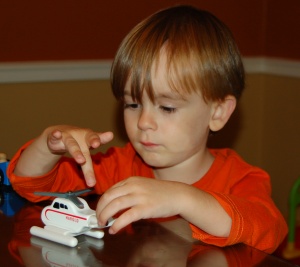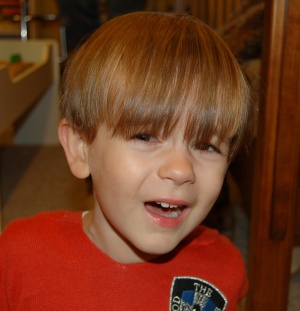Dear Simon,
They say that by three you can pretty well tell who your child is, that whatever you see at three is what you’re going to get. The same ambiguous “they”s out there say that key intellectual and emotional development happens by three, that your child’s life, care, and experiences in the first 36 months form the building blocks of all that follows.
I don’t know if this is true, Simon, but I sure hope it is. I certainly, certainly do.
For when you were two, you were a delight, no doubt about it. But the terrible twos loomed on the horizon, so I dared not assume delightfulness would stick around. Now that you are three, you are still a delight, and so I presume that the sweet little boy I’ve grown to know is here for the duration. Anything else—a tough day, week, month, or even year—I’m just going to call a phase.
The real you is pretty much the same kid I described a year ago. You are funny, affectionate, empathetic, sweet, bright, silly, and stubborn. I like you. I can already see that we will be friends as adults. In a way, we already are. After all, my friends are the people who make me feel cared for and make me laugh, just like you do, and many of them share your basic temperament.
You make me laugh every day. Sometimes it’s because of things you say. Like the day when you began talking about mommy crashing the car in Great-Great-Grandbubbie’s garage. Other times, it’s because of things you do. Like the day you announced that you were going to run in circles and then did, right in our narrow hallway, until you made yourself dizzy and fell down.
You certainly make me feel loved every day. You fix me with sparkling eyes when you are excited about something and soft eyes when you just need a hug. Usually these glances come when we are snuggling on the couch or on your bed, but every now again you catch me unawares at a pizza parlor, on a park bench, or in the middle of a game. Those times, I’ll be reading or throwing a ball or blowing on your food when you will suddenly fix your gaze on me and give me a spontaneous kiss. Sometimes you throw in an “I love you” or “You my best friend” for good measure. Those moments, my dear, reorder my entire universe in a way you couldn’t possibly understand.
I just read the letter I wrote you last year, and excepting the references to illnesses, high chairs, and cribs, I find that surprisingly little has changed. You are very much the totally gentle and sweet boy’s boy I described 12 months ago. Some people may wonder how you can be sweet and gentle and a boy’s boy at the same time? In popular thinking, this description is self contradictory. But how else can I describe a boy who has taken to crashing his cars into each other, but then pauses to have them apologize to each other, hug, and kiss after the fact?
At three as at two, you still love the idea of love. Almost every day we will spend some time discussing the people you love. You love your parents, your grandparents, your aunts, your uncles, and your cousins. You love our cats. You love your teachers—Laura, Lana, Fira, Jean, Lotte, Inessa, and Lisa last year, and Jill and Judy this year. You love your school friends, especially it would seem Anieya, Jillian, and Gabrielle. You love your friend Leah. You love your first friend Sophie most of all.
You still love being outside. I sometimes think of you as my little nature boy. When you were still an infant, I could end almost any crying session by taking you outside. There were early colicky days when I’d put you in the stroller when it was well below freezing, endure critical stares and shaking heads from well meaning strangers, and secretly worry I was shocking you more than calming you. Nearly three years on, I can still cheer you up or calm you down by going outside. You still delight in swinging. You still like playing on slides and play sets, though these days you slide down backwards more often than not and can finally do a bit of climbing. Most of the time, though, you’d rather run around and look at things like leaves, bugs, dirt, rocks, water, ducks, geese, or dogs.
And speaking of running, oh my goodness do you love to run. Most kids love to run, it is true. But your dad and I have been taking you to parks for a long time now, and we rarely see a kid run as much or with the same joy that you do. In fact, I don’t think we ever have. The only thing you love as much as running?
Throwing. Just last week, your Dad and I took you to Cave Hill Cemetery and watched in delight as you spent an hour looking for walnuts and throwing them into the pond. Other objects crying out to be thrown are mulch, sticks, rocks, and even occasionally balls. I’ve heard it from multiple good authorities that owing to your “heckuva arm” and the fact that you throw lefty that you have a future in baseball. Time shall tell. At the present, you seem more interested in soccer and golf and …
… oh boy, Nascar. I just don’t know what to do about that. Your father recently decided that after a year of watching Cars regularly, he’d turn on the real deal and see what you thought. What you thought was “Ooohhh, the cars are going fast!” and “Daddy, I want to see the fast cars again.” Honey, your father and I are just not into cars. We barely had one in Michigan and we didn’t have one at all in California. Now we drive two 10-year-old Toyotas that are family hand-me-downs. The car gene is lacking in us both. Can you continue to admire from afar? Does your current fascination mean you will drive like a maniac when you are 16?
So that’s you at three. A more developed, more agile version of who you have always been:
- The toddler who loved cars is now the little boy who goes to sleep with one clutched in each hand.
- The toddler who loved his crib is now the little boy who loves his twin-sized bed.
- The toddler who held back from groups is now the little boy who is slowly learning how make his way in a crowd.
- The toddler who loved books is now the little boy who has memorized many and who tucks a few under his pillow each night.
- The toddler who loved balls is now the little boy who can dribble a soccer ball, shoot a basket, hit a golf ball, and make a marble speed through a chute.
- The toddler who babbled incessantly is now the little boy who talks—incessently—in complete, sophisticated sentences.
And that’s the thing. Potty trained or no, you’re clearly a little boy now. You have long progressed past toddling, you can tell me your full name and address, the fat is gone from your face, and you are getting longer and leaner by the day. What remains unchanged is that there is never a night when I don’t feel warm and fuzzy after tucking you in, and there is rarely a morning I don’t happily anticipate your waking up. And when I’m feeling selfish, Simon, I still despair that these days number so few.
Happy birthday dear boy. Can I still call you my little Stinkpot?

